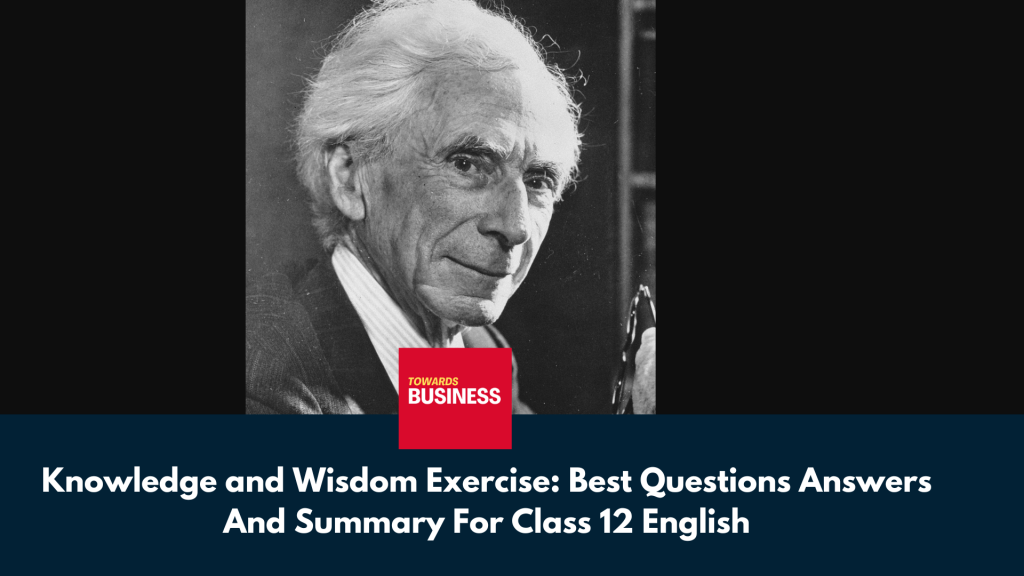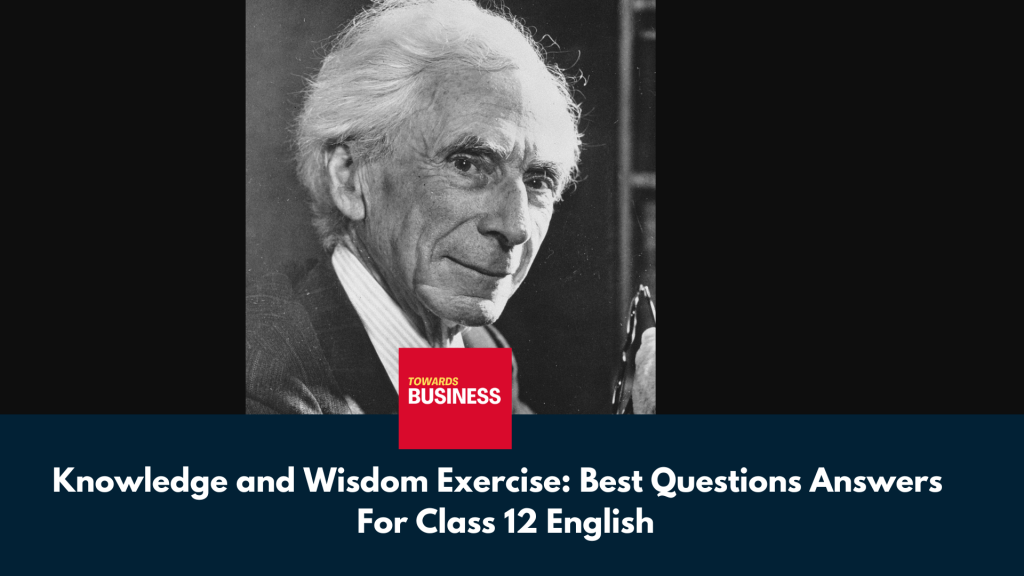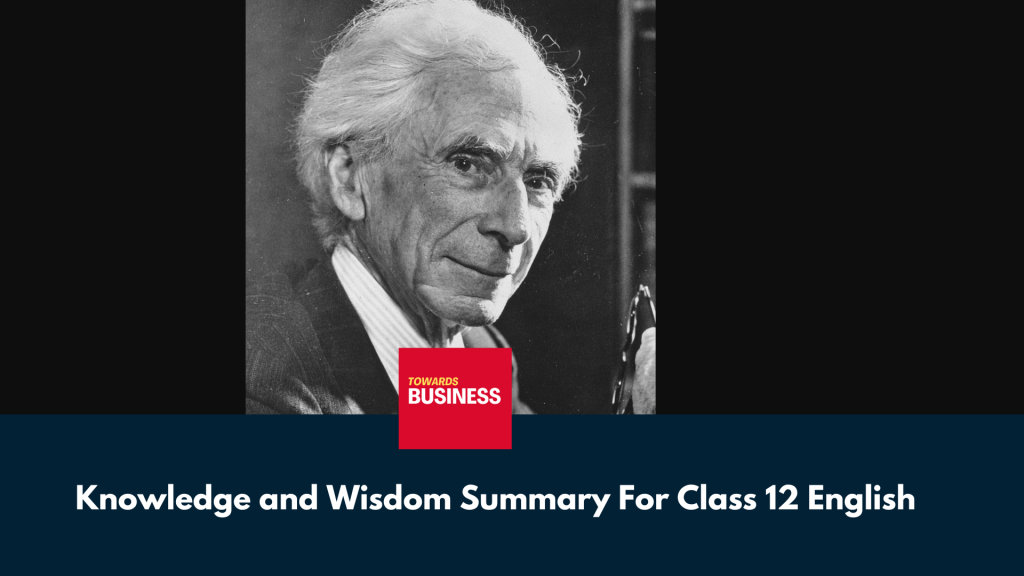Knowledge and Wisdom Exercise by “Bertrand Russell”. In this essay, Russell differentiates between knowledge and wisdom. Knowledge and wisdom are different things. According to him, knowledge is defined as the acquisition of data and information, while wisdom is defined as the practical application and use of the knowledge to create value. Wisdom is gained through learning and practical experience, not just memorization.

In this article, we’ve listed the best question answers as well as the summary of the Knowledge and Wisdom Exercise as part of the class 12 English curriculum. Here is the table of contents:
- Knowledge and Wisdom Exercise: Best Question And Answers For Class 12 English
- Knowledge and Wisdom Exercise: Reference To The Context For Class 12 English
- Knowledge and Wisdom Exercise: Reference Beyond The Text For Class 12 English
- Knowledge and Wisdom Summary For Class 12 English
Knowledge and Wisdom Exercise: Best Question And Answers For Class 12 English
Listed below are all the best questions and answers for the Knowledge and Wisdom Exercise for Class 12 English.

a. What are the factors that contribute to wisdom?
Russell addresses numerous variables that are linked to wisdom in his essay “Knowledge and Wisdom.” According to him, the following characteristics lead to wisdom:
(I) a sense of proportion,
(ii) comprehensiveness with wide emotion,
(iii) emancipation from personal biases and sensory experience,
(iv) impartiality, and
(v) Awareness of human needs and understanding.
b. What message does the writer try to convey with the example of technicians?
The writer uses examples of technicians to convey a lesson about risks. He believes that knowledge alone cannot save the world. Knowledge without wisdom will not assist the world and, in certain situations, may threaten mankind. For example, scientists discover new medicines but have no idea how these treatments will affect people’s lives. These medicines may reduce infant mortality, but they may also increase the population. It may cause food shortages in underdeveloped nations. More population may result in a worse level of life. The knowledge of the atomic composition might be misused by lunatics to destroy the globe. If misused, knowledge of atoms can lead humans to destruction by manufacturing nuclear weapons.
c. Which leaders does Russell say were able to mix knowledge and wisdom soundly?
Russell claims that leaders such as Queen Elizabeth I of England, Henry IV of France, and Abraham Lincoln were able to successfully combine knowledge and wisdom. Both Queen Elizabeth I and Henry IV avoided the flaws of their times, and in doing so, they were both compassionate and certainly not failed. Similarly, Abraham Lincoln conducted a huge struggle while never deviating from the path of wisdom.
d. Why is wisdom needed not only in public ways but in private life equally?
Wisdom is not only required in public but it is also required in private life. It’s necessary for setting goals and objectives decisions, as well as letting go of one’s own biases. We may not be able to determine our life’s mission or have the patience to persuade others about it if we lack wisdom.
e. What, according to Russell, is the true aim of education?
According to Russell, the true aim of education is to establish wisdom in people. Wisdom is what enables us to use our knowledge in the actual world without harming others. People must have both knowledge and wisdom to be great citizens.
f. Can wisdom be taught? If so, how?
Yes, wisdom can be taught as an educational aim. The story of the Good Samaritan teaches us to love our neighbor, whether friend or enemy. However, in many cases, we misunderstand the point of this story because we fail to embrace people who hurt society. The only way to overcome hatred is to spread knowledge. In the course of providing knowledge, the dangers of hate and narrow-mindedness might be highlighted. Russell believes that knowledge and wisdom may be blended in the educational program. People should be educated to see things in context with the rest of the world. They should be encouraged to consider themselves global citizens.
g. Why does the world need more wisdom in the future?
In the future, the world will require more wisdom. When we analyze the existing state of knowledge in various fields, we can see that knowledge will continue to change in the future. Most people abuse information in the absence of wisdom, resulting in a range of negative outcomes, and this trend will continue in the future unless knowledge is combined with wisdom. Only wisdom enables people to make wise use of the knowledge they’ve learned. For a brighter future, more wisdom is necessary.
Knowledge and Wisdom Exercise: Reference To The Context For Class 12 English
Listed below are the answers to the ‘Reference to the context’ part of the Knowledge and Wisdom Exercise
a. According to Russel, “The pursuit of knowledge may become harmful unless it is combined with wisdom.” Justify this statement.
According to Russell, “the pursuit of knowledge may become harmful unless combined with wisdom.” The essay “Knowledge and Wisdom” by Bertrand Russell examines the significance of combining knowledge and wisdom. He examines the various paths to wisdom and the dangers of knowledge without wisdom.
Russell emphasizes the value of comprehensiveness while also stating that comprehensiveness does not equal wisdom. Hegel’s philosophy was vast, yet it lacked expertise and was biased. Hegel wrote with tremendous historical knowledge, yet he misled the Germans into believing they were the world’s most powerful race, leading to war. As a consequence, knowledge, and emotions must be blended. Men with knowledge but no emotions lack wisdom. In both public and private life, wisdom is essential.
b. What, according to Russell, is the essence of wisdom? And how can one acquire the very essence?
Russell believes that it is unwise to pursue certain goals if it is impossible to achieve. He points out that the essence of wisdom is to free oneself from the confinement of the physical world and the emotional world and look beyond. He also points out that emancipation from personal prejudice makes one’s thoughts and feelings to become less personal which contributes to wisdom.
Wisdom does not come immediately with knowledge. According to Russell, wisdom is defined as the practical application and use of knowledge to create value. One can acquire the very essence through learning and practical experience, not just memorization.
Knowledge and Wisdom Exercise: Reference Beyond The Text For Class 12 English
Listed below are the answers to the ‘Reference beyond the text’ part of the Knowledge and Wisdom Exercise
a. Why is wisdom necessary in education? Discuss.
Russell believes that intelligence is required in personal relationships to avoid hatred for one another. Because of their bias, two people may stay adversaries. The path to wisdom is to release ourselves from the grip of our sense organs. Our senses help to shape our ego. Wisdom is required in education since wisdom is highly important in education. Our thoughts and feelings grow less personal as we gain wisdom. It encourages us to make appropriate use of our knowledge. It enables us to put our knowledge to good use for humanity. We love even our enemies when we have wisdom, we have no ego, and we don’t have any prejudices.
Wisdom is an element of human life that complements education/knowledge. If one balances these two aspects correctly, he or she becomes a perfect being.
Knowledge, according to him, is the learning of facts and information, but wisdom is the actual application and use of knowledge to generate value. People who lack wisdom may misuse their gained information, and wisdom does not come naturally; it must be taught. Developing wisdom in students has to be one of the educational goals, and it has to be taught in schools. With practical examples, it must be planted and nurtured in one’s mind. It is not something that comes naturally.
b. How can you become wise? Do you think what you are doing in college
Although wisdom is difficult to explain, we simply recognize it when we see it. The wise people maintain their calmness under pressure. They are aware of the limitations of their expertise, take into consideration alternative opinions, and keep in mind that things are always changing. Wise people are self-conscious, receptive to new ideas, and aware of the reality that their surroundings are always. Although wisdom is difficult to explain, we simply recognize it when we see it.
The wise people maintain their calmness under pressure. They are aware of the limitations of their expertise, take into consideration alternative opinions, and keep in mind that things are always changing. Wise people are self-conscious, receptive to new ideas, and aware of the reality that their surroundings are always changing.
Acquiring knowledge and wisdom does not happen overnight. The secret to becoming wiser is to be patient and disciplined. Higher life satisfaction, fewer negative emotions, stronger relationships, and less depressed ruminating are all linked to wise thinking. An intelligent man makes errors. You gain knowledge through your blunders. It’s important to keep in mind that you learn and get better the more mistakes you make.
Maintaining happiness is a step toward becoming wiser. Whatever occurs in your life, try to remain positive, hold onto your faith, and approach issues gently. A sensible guy has no fear in any circumstance. He or she attempts to resolve the issue amicably. These are, in my opinion, the specific methods for becoming intelligent.
About Author
Bertrand Arthur William Russell (1872–1970) was a British philosopher, logician, essayist, and social critic best known for his work in mathematical logic and analytic philosophy. His most influential contributions include his championing of logicism (the view that mathematics is in some important sense reducible to logic), his refining of Gottlob Frege’s predicate calculus (which still forms the basis of most contemporary systems of logic), his defense of neutral monism (the view that the world consists of just one type of substance which is neither exclusively mental nor exclusively physical), and his theories of definite descriptions, logical atomism, and logical types.
In this essay, Russell differentiates between knowledge and wisdom. Knowledge and wisdom are different things. According to him, knowledge is defined as the acquisition of data and information, while wisdom is defined as the practical application and use of the knowledge to create value. Wisdom is gained through learning and practical experience, not just memorization.
Knowledge and Wisdom Summary For Class 12 English
Here is the summary of the Knowledge and Wisdom Exercise for class 12 English.

Wisdom and knowledge are two distinct concepts. Russell defines wisdom as the application of knowledge in a practical way to add value. Knowledge, on the other hand, is characterized as the gathering of data and information. Wisdom comes from knowledge and experience, not simply memorization. The numerous paths to gaining Wisdom are defined by knowledge and wisdom. He laments the fact that, despite the enormous amount of knowledge acquired, wisdom has not grown in proportion. By describing the factors that lead to wisdom, Russell provides us with a definition of wisdom.
He defines wisdom by describing things that contribute to wisdom. A sense of proportion is the first. It is the ability to carefully consider each significant aspect of a situation. Specialization makes it challenging. For instance, when new drugs are discovered, scientists are unsure of how these discoveries will affect people’s lives. The infant mortality rate might be lowered by the medications. But it could result in a rise in population. It may result in a food crisis in underdeveloped nations. More population might result in a decline in living standards. A lunatic may exploit the understanding of the atom’s structure to wipe off humanity. Atomic knowledge may be utilized to create nuclear weapons, which, if misused, will destroy humanity.
Wisdom without knowledge may be dangerous. It should be integrated with all of humanity’s requirements. Even complete knowledge is insufficient. It should be connected to a clear understanding of life’s purpose. The study of history can also provide examples. For example, Hegel wrote with tremendous historical knowledge while convincing the Germans that they were a superior race. It sparked a conflict. Therefore, it is vital to blend information with emotions. Men who have the knowledge and have no feelings lack wisdom.
Both in public and private life, we require intelligence. To choose what to do with our lives, we need wisdom. We must overcome our preconceptions. We may follow even a novel thing unwisely if it is too big to achieve. The man may attempt to achieve the impossible, he may harm himself in the process.
To establish our life’s purpose, we need wisdom. We demand that it be free of any personal bias. If a new concept is too ambitious to accomplish, we could pursue it ineffectively. People have given their lives in search of the “philosopher’s stone,” also known as the “elixir of life.” They had no usefulness. They were seeking straightforward answers to the complex problems facing humanity. A man may endeavor to do the impossible, but he may put himself at risk in the process.
Similarly, in personal life, wisdom is essential to avoid hatred for one another. Two individuals may continue to be opponents due to their prejudice. One could hate the other due to their perceived flaws. If you tell them that everyone has flaws, they can end up being friends. Russell believes that sensible debate may help us stay away from hate. We must free ourselves from the control of our senses to advance toward knowledge. Our senses cause our ego to expand. Without our senses of sight, hearing, and touch, we cannot survive. Our senses are the main tools we use to perceive the outside world.
As we grow, we come to understand that there are other things. We start to identify them. As a result, we no longer see ourselves as individuals. As a result, we no longer regard ourselves as individuals. We become wise when we start to think about other people. We sacrifice our egos. Even if it is difficult to completely eradicate selfishness, we may try to think outside of the box. When we start giving importance to things that don’t directly affect us, wisdom starts to develop. We start to learn wisdom when we start to love other people.
Wisdom, according to Russell, can be taught as an aim of education. The message in the parable of the Good Samaritan is that we should love our neighbor whether friend or foe. Many a time we miss the message in this parable (story/fable)because we fail to love those who cause harm to society. In brief, Russell tells us not to hate anybody. The author draws out examples from the history of Queen Elizabeth I, Henry IV, and Abraham Lincoln, who were free from the errors committed by other eminent people in the past.
In the course of imparting knowledge, the hazards of hatred and narrow-mindedness might be highlighted. Russel believes that knowledge and values can be blended into an educational plan. People should be educated to see things in context with other aspects of the world. They should be encouraged to consider themselves global citizens.
In conclusion, the author lists five factors that lead to wisdom. They are as follows:
(I) a sense of proportion,
(ii) comprehensiveness with wide emotion,
(iii) emancipation from personal biases and sensory experience,
(iv) impartiality, and
(v) Awareness of human needs and understanding.
